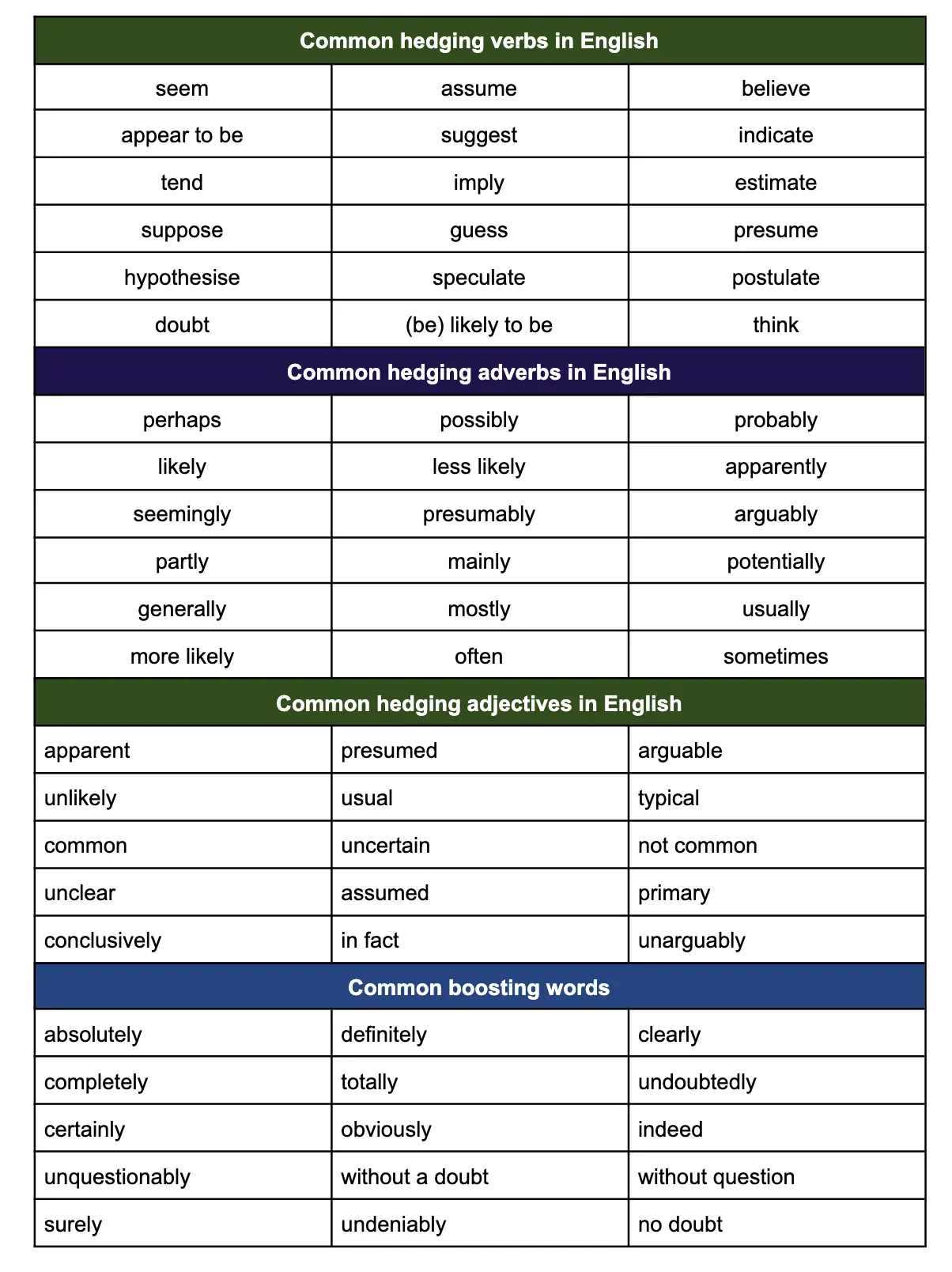1. What is hedging, and how can we use it in a sentence?
Hedging is used when the speaker or writer wants to make a statement less forceful or less direct. By using hedging, we can make our statements more cautious, polite or diplomatic, and avoid making absolute statements that might be incorrect. Common hedging words and phrases include: may, might, could, can, possibly, seems, appear to be, tends to, sometimes, usually, generally, in some cases, to some extent, etc.
1.1 Examples of hedging in a sentence
● It seems that she is not coming to the party.
● The movie could be a blockbuster, given the popular actors.
● He tends to forget his keys.
● You might find it helpful to review the notes before the test.
● The restaurant may be closed on Sundays.
● The results suggest that diet can influence health.
● There appears to be a correlation between sleep and productivity.
● It is possible that the meeting will run over time.
● He usually prefers tea over coffee.
● It generally rains here in the evenings.
● It could be argued that exercise is as important as a balanced diet.
● The data seems to indicate a rise in sales this quarter.
● It may be the case that we have to reschedule our trip due to bad weather.
● In some instances, the medication can cause drowsiness.
● They probably won't be able to finish the project by the deadline.
● It is likely that she will win the election.
● He isn’t necessarily the best candidate for the job.
● The team typically holds meetings on Monday mornings.
● It appears that we have made a mistake in our calculations.
● There could potentially be a delay in the shipment.
1.2 Common hedging expressions in English
| Common hedging verbs in English | ||
|---|---|---|
| seem | assume | believe |
| appear to be | suggest | indicate |
| tend | imply | estimate |
| suppose | guess | presume |
| hypothesise | speculate | postulate |
| doubt | (be) likely to be | think |
| Common hedging adverbs in English | ||
|---|---|---|
| perhaps | possibly | probably |
| likely | less likely | apparently |
| seemingly | presumably | arguably |
| partly | mainly | potentially |
| generally | mostly | usually |
| more likely | often | sometimes |
| Common hedging adjectives in English | ||
|---|---|---|
| apparent | presumed | arguable |
| unlikely | usual | typical |
| common | uncertain | not common |
| unclear | assumed | primary |
| conclusively | in fact | unarguably |
2. What is boosting, and how can we use it in a sentence?
Boosting expressions are used to show confidence in results or statements. They are used to enhance or amplify the force or quality of a statement. It is a way of expressing certainty or adding emphasis to what you’re saying. When using boosting, you are making a strong claim or expressing a high degree of certainty about something.
2.1 Examples of boosting in a sentence
● It’s absolutely clear that the company’s new policy has boosted productivity.
● I am totally convinced that this is the right path for us.
● She is certainly the best candidate for the job.
● It is unquestionably true that exercise contributes to better health.
● You are undoubtedly the most talented artist in this competition.
● It’s completely obvious that he’s not interested in the proposal.
● It’s definitely going to rain tomorrow according to the forecast.
● The show was incredibly successful, attracting millions of viewers.
● It is undeniably true that global temperatures are rising.
● Our team is clearly the strongest in the league this year.
● She is genuinely the kindest person I’ve ever met.
● It’s entirely evident that she has worked hard on this project.
● He is extremely intelligent and excels in every subject.
● There is no doubt that you are the best cook in the family.
● It is literally the coldest day of the year.
● The evidence conclusively proves his innocence.
● I am categorically against the proposed changes.
● She is exceptionally good at solving complex problems.
● His performance was remarkably impressive.
● The response to the event was overwhelmingly positive.
2.2 Common boosting expressions
| Common boosting words | ||
|---|---|---|
| absolutely | definitely | clearly |
| completely | totally | undoubtedly |
| certainly | obviously | indeed |
| unquestionably | without a doubt | without question |
| surely | undeniably | no doubt |
Let’s study more examples to help you understand more about hedging and boosting in English.
“It is undeniable that regular exercises improve mental well-being.” In this sentence, the term undeniable emphasises the writer’s conviction about the benefits of regular exercise in mental health. The writer leaves little room for a possible opposing view. However, in the sentence “It is believed that regular exercise might contribute to better mental health.” The writer is less confident about the benefits of regular exercise in mental health. The writer leaves room for a possible debate.
3. Learning materials to download

